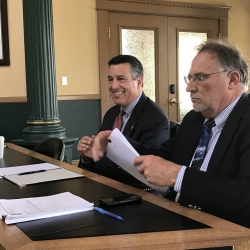Governor Brian Sandoval of Nevada recently warned U.S. Attorney General Jeff Sessions not to ban online poker in Nevada. Jeff Sessions stated in his Senate confirmation hearings that he was “shocked” that the previous administration’s Justice Department approved online casinos and poker gaming, leading to speculation that he would reverse a 2011 opinion on the issue.
Brian Sandoval and Jeff Sessions, both Republicans, had a meeting recently in which the subject was discussed. Governor Sandoval assured AG Sessions that his stated concerns about online gambling are addressed with Nevada laws and current technological advancement.
Underage Gambling on the Internet
One of Jeff Sessions’ biggest concerns about online and mobile gambling is whether underage children can play illegally.
Proponents of legalized online gambling claim that verification technology makes it difficult for underage children to access real money gambling sites.
Opponents of legal online betting often suggest that most children can circumvent the verification technology, but Sandoval addressed that notion directly with Sessions.
Michelle Rindels Tweets on Sandoval-Sessions Meeting
Michelle Rindels of the Nevada Independent political news website discussed the meeting between Governor Sandoval and Attorney General Sessions recently.
Michelle Rindels posted to Twitter of the meeting, “@GovernorSandoval asked AG Sessions that if any adverse action is taken against online gambling, that it not include Nevada. @GovernorSandoval told Sessions he’s ex-gaming regulator, negotiated interstate poker compact, knows of no kids accessing NV legal online poker.”
The argument about verification software underscores the reasons for legalization and regulation. A regulated online casino and poker market would require operators to have industry standards on the prevention of underage gambling. The state could take away a site’s license if it failed to uphold standards, costing the site millions of dollars of legal revenues. Such an incentive would assure that poker sites and online casinos would maintain cutting edge technology to verify identities. ‘
Federal Ban Would Increase Underage Gambling
If the US Justice Department instituted a strict ban on online gambling sites, it would not end online and mobile gambling in the United States. Many, if not most, of the gamblers currently playing legally would continue to gamble. They would seek out unlicensed offshore operator’s casino sites and card rooms, which would not have the protections regulated sites would. Furthermore, unscrupulous operators would have no incentive to turn away illegal underage gamblers.
In their meeting, Brian Sandoval tried to convince the Attorney General that he would be encouraging underage gambling by banning online casinos and poker rooms. Whether that argument had any weight with Jeff Sessions is another matter.
Protections for Regulated Gamblers
When a state or country legalizes gambling and passes regulations, they can institute a number of requirements for legal opperators. Those include self-exclusion lists and online “panic buttons” for compulsive gambling. The state can require a gambling operator to offer helpline or hotline services, or advertise on their site the numbers for state-approved counseling and hotlines.
Many states negotiate to have betting limits placed on gaming sessions. These might exist on a per-day, per-week, or per-month basis. Operators have been required at times to fund anti-gambling campaigns at children and other at-risk groups. The list of possibilities to combat problem gambling is great, when government officials have the leverage of legalization at hand.
When gambling is banned, all those options do not exist. Jeff Sessions has shown he prefers an unregulated business environment, yet he also wants a public that does not gamble online. In the real world, that does not exist. Just like the ban on alcohol in the Prohibition Era, if adults want to gamble online, no state laws are going to stop them. Regulation is the best chance to keep children from betting online, because it means parents, government officials, and gambling operators are working towards the same end.

